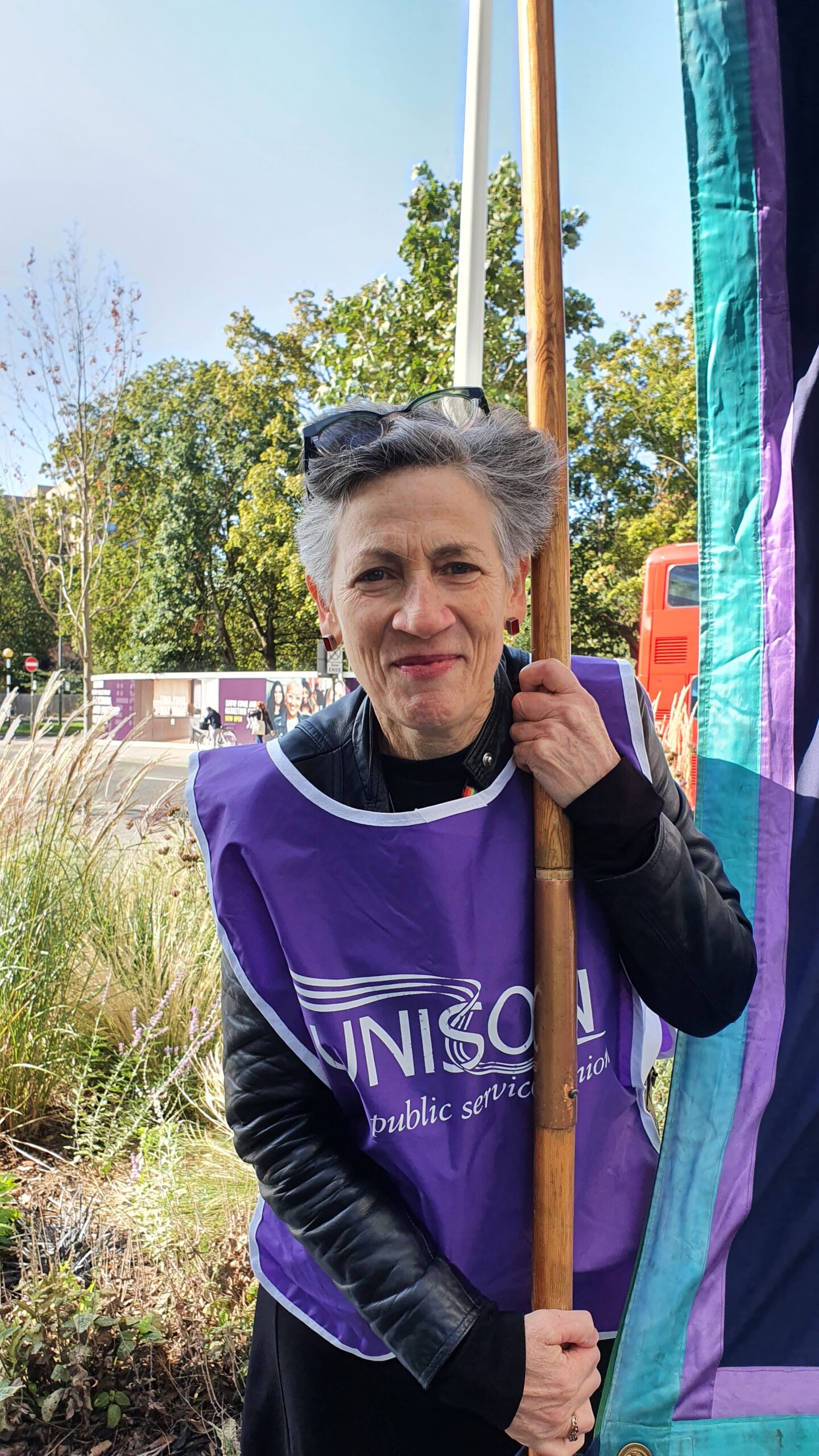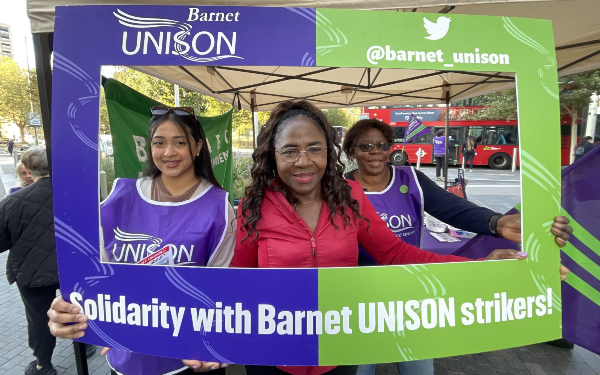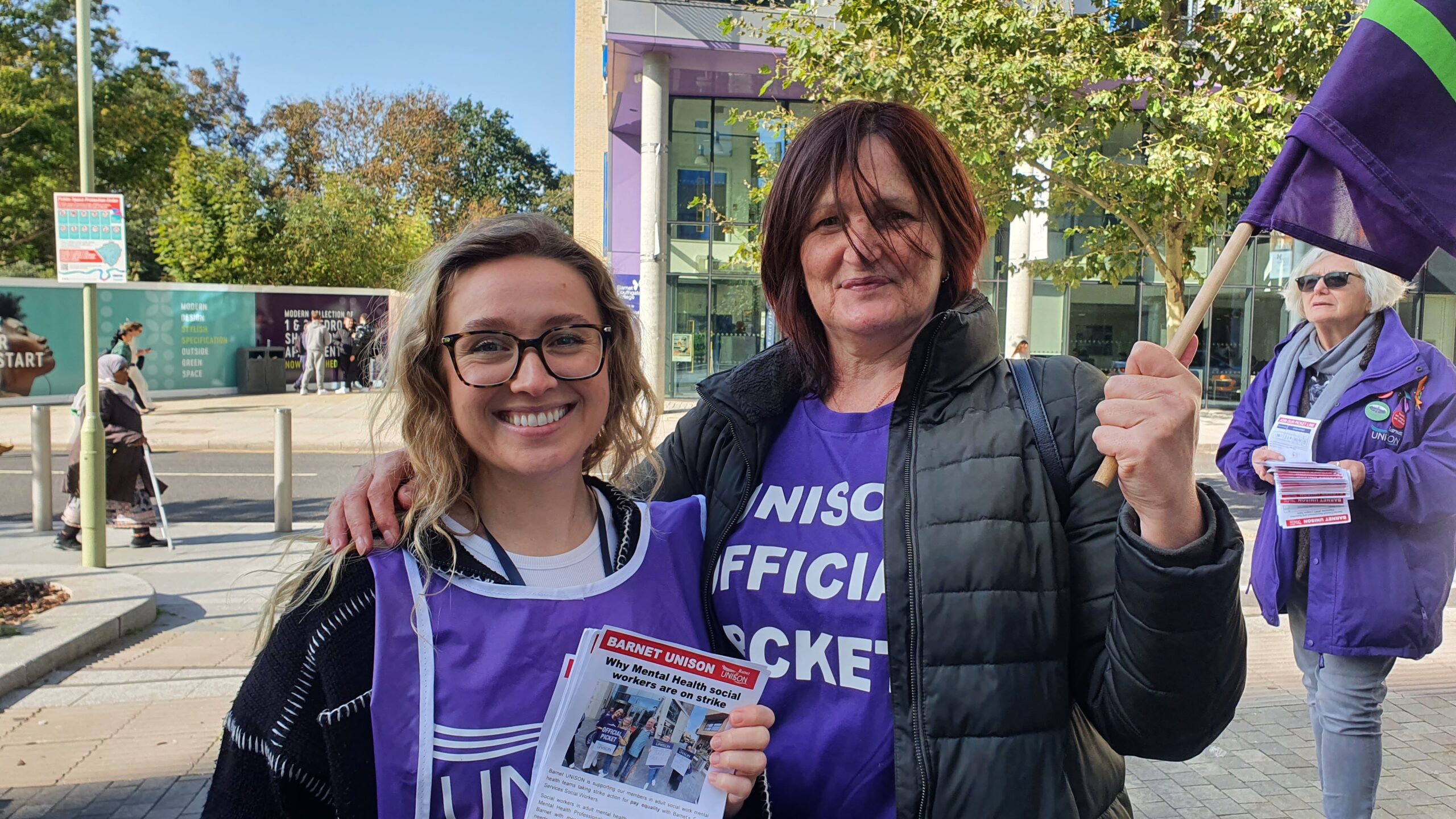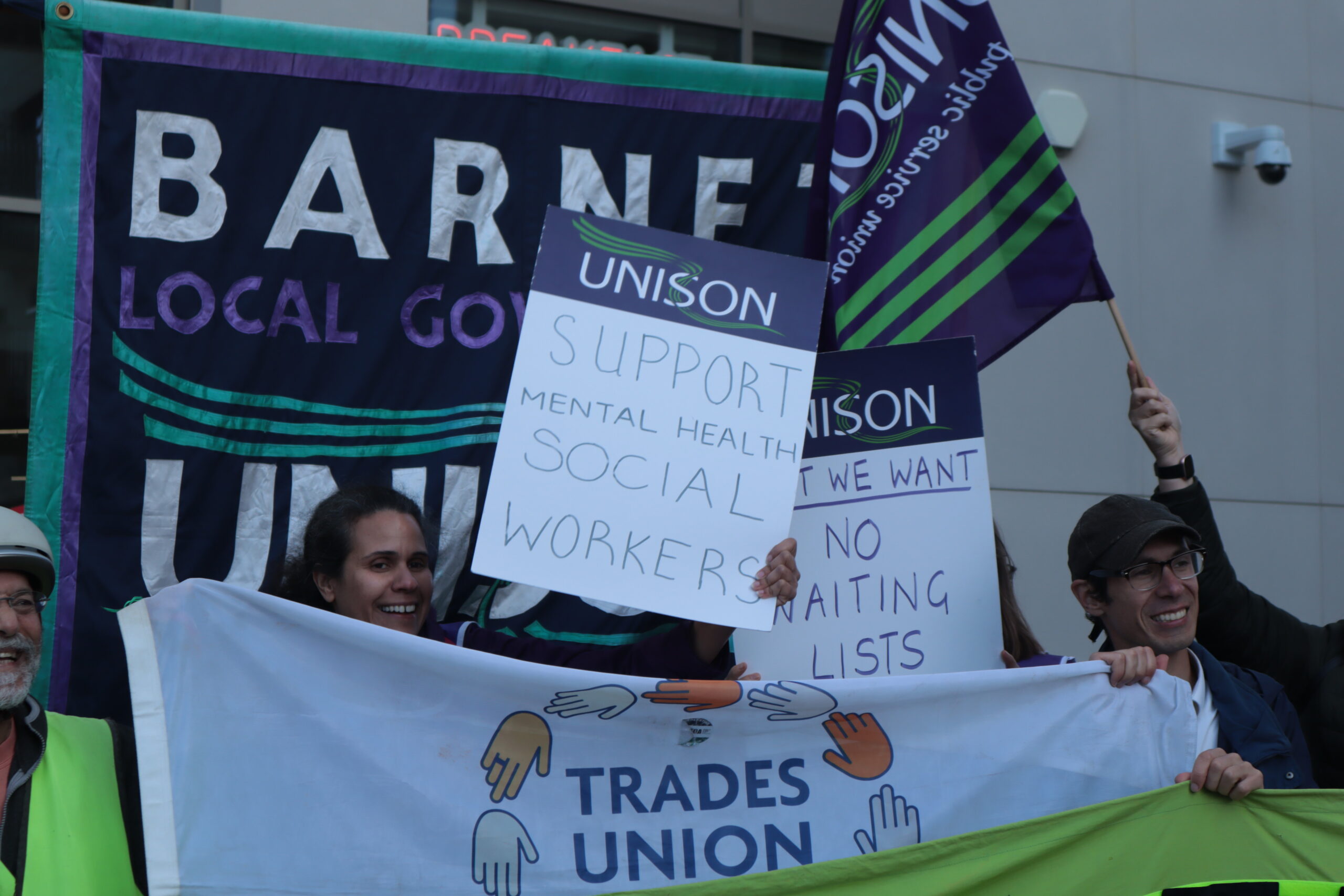
How far do you feel valued by senior management in your workplace?
- Not at all (41%, 174 Votes)
- Not very much (37%, 157 Votes)
- Quite (15%, 62 Votes)
- Very (6%, 27 Votes)
Total Voters: 420
Before I even rounded the corner to Barnet Council’s offices, I could hear the chants.
Under the shadow of the council’s towering glass-fronted building, social workers from the borough’s approved mental health professional (AMHP) service and its north and south mental health teams were protesting.
Music echoed from a stereo on the floor, creating an almost celebratory atmosphere, but the surrounding chants and held-up signs of “safe service” and “no waiting lists” left no room for illusions.
It was Barnet UNISON members’ third day striking over what they described as chronic staffing issues, worsening practice and “extraordinarily” high waiting times for people needing support.
UNISON reported 14 practitioners had left Barnet’s mental health teams in 2023, against a staffing complement of 31. By the time of the strike, another one was preparing to exit.
According to an experienced practitioner, Kofi Antwi, high vacancy levels had also led, at times, to significant use of agency workers, who “build a caseload and then disappear, leaving permanent staff to deal with the aftermath”.
Service ‘not safe for staff or service users’
“There’s nothing worse than being in a team where you’re constantly having people leaving,” said Barnet UNISON branch secretary John Burgess. “The waiting lists are extraordinarily high and all the experienced staff have left or are leaving.”
“It’s not safe for staff and it’s not safe for service users, because if you don’t build relationships with social workers, how is that meant to be therapeutic?”
To improve retention, UNISON has asked for a 20% market supplement on top of pay, in line with the 7.5% to 25% payments received by the authority’s family services social workers.
The council made an alternative offer to mental health staff and adult social care colleagues – £1,000 per year for the next two years – which the union said was worth 2.6% of practitioners’ salaries on average.
Barnet’s offer to practitioners
In the authority’s view, staffing levels have been good and the pay competitive.
In a statement to Community Care, Barnet’s cabinet member for adult social care, Paul Edwards, said that 30 of the 31 posts were already filled, by 26 permanent staff and four locums.
Earlier this year, the council had also added five extra practitioner posts to the teams and increased AMHPs’ pay by 10%.
Its latest offer, in addition to the annual pay award, placed the council at the top of the salary range paid by local authorities, said Edwards.
However, the offer was not received well by Barnet’s mental health practitioners, with 100% of UNISON members who voted backing strike action in a ballot held over the summer, triggering six days of walkouts in late September and October.
Mental health social workers ‘forgotten about’

Pictured: Gill Robinson
For AMHP manager Gill Robinson, who left the service during the week we visited the picket line, the strike was the culmination of years of mental health services being “largely forgotten about” and “undervalued”.
“Like all those working in the public sector, we haven’t had any decent salary rise in years, but everything around us is coming up in value,” she said.
“We feel like we’ve been punished for doing this work. And yet, we’ve learned in the pandemic that this is the kind of work that has to keep going, regardless of what’s going on. Because it is what’s helping sustain people under huge enormous psychological stress.”
Her sentiments were echoed by colleagues on the picket line. Despite the outspoken determination to continue striking, there was visible frustration at feeling forced to take the dispute this far.
“We’re all in this job because we’re so passionate about being there to support residents with mental health difficulties,” said Suzannah Lindley, a newly qualified practitioner. “The idea that we have to then take time off to make it close to a safe service for them is just really frustrating.
“We’re under such stress, constantly feeling there’s no time in the day to do all the work and manage cases – we’re essentially firefighting. So to go on strike and then be missing more of that work, it’s not something that any of us find enjoyable but that’s how frustrated we are.”
‘You can only deal with crisis-level work’

UNISON vice president Julia Mwaluke on the picket line with Barnet UNISON members
Like Lindley, around half of those striking had qualified less than two years ago, and all reported feeling like they were failing Barnet residents.
The pressure from teams’ rapidly expanding waiting lists had brought pressure to close cases sooner rather than later, they said.
According to practitioners, residents couldn’t see a professional in time, and when they did, their time together was often brief.
“The service is so stretched you can really only deal with crisis-level work,” said Kristiana Heapy, who qualified in September 2022.
“You feel you’re letting down the residents. You can’t see them until they’re in crisis, because then they might get to the top of the queue. It’s really at odds with the social work values [we were taught].”
Just in the past 18 months, at Lindley’s team, the wait to see a practitioner had risen from four to 14 months, she said.
The constant pressure of looming cases also meant that time for reflection has become sparse, something that Lindley said led to “decisions being made from reactions, rather than careful consideration”.
“We’re just not in a position to do the really laborious, value-oriented work that we’re in the profession to do. The blinkers come on when you’re under that much pressure.”
Professional guilt
As a new mental health practitioner, Lindley found herself grappling with the guilt that came when following a relationship-based approach with people in an overstretched service.
“If we do work with people over a long period, it means that we’re not getting to the other people on the waiting list,” she said.
“I find it very difficult to separate the anxiety that comes from knowing that, by spending a lot of time with one person, you’re not able to support people on our waiting list in acute situations. That’s not a nice condition to work under – it’s such a distraction to the work that you want to do.”
NQSWs put in ‘vulnerable situations’

Pictured: Katy Swanson (left) and Mary Sexton (right)
Newly qualified social workers have also largely borne the brunt of the service’s staffing issues, practitioners said. The lack of available experienced staff meant they were often put in “vulnerable situations” without proper grounding, according to Mary Sexton, who has been working for Barnet for 22 years.
A newly qualified social worker in Sexton’s team, Katy Swanson, had found the start of her career at Barnet particularly trying.
“When I was a student here, there were never really that many experienced people in the team that you could learn from and go to for help,” she said. “We were often left with quite complex and high-risk cases.
“And don’t get me wrong, our manager in the team is amazing. But that’s not enough. You need a strong workforce of experienced people who have been in Barnet for a while, know the processes and know everything like that. It was tricky.”
26 more days of strike action
Three days into the strike, social workers had yet to hear back from senior leaders, who, Burgess said “weren’t appearing to take the strike seriously”.
“The response from Barnet Council as of today is silence,” he said. “Their strategy at the moment seems to be to close their eyes and pretend that things will go back to normal at the end of the six days. Well, I can assure them that that’s not going to be the case.”
Two weeks after our visit, UNISON announced that practitioners would be taking part in 26 more days of strikes, from November 2023 to March 2024.
For the council, Edwards said it was “grateful for the dedication and commitment of our mental health social workers, who provide excellent support to our residents at a challenging time for adult social care nationally”.
Impact of cost of living crisis on council
However, the authority was having to balance conflicting demands on its budget, he added.
”The cost of living crisis means that Barnet Council must find ways to help our residents in need and maintain services, at a time when our central government funding is not adequate to the situation we face.
“It is also affecting all our staff, including all our social workers and those that work in mental health. Our employees are at the front line of supporting our vulnerable residents. We truly appreciate all the excellent work they do.
“Balancing all these demands – our service users and wanting to support all our staff – we have striven to offer good support and pay to our social workers, with salaries that benchmark well.”
‘Strike for residents’ long-term benefit’

Pictured: Barnet mental health social workers striking
Practitioners were acutely aware of the impact of the strike on those they support. However, they maintained that this was to service users’ long-term benefit.
“It’s hard to do anything which you feel would negatively impact the people you work with and the only reason we can see it as justified is because, at the moment, we don’t think they’re getting a safe service,” said Heapy.
“So I appreciate that’s going to be frustrating in the short term, but I think we need to look at how do we create something that’s fit for purpose for Barnet residents.”
However, said Robinson, fellow social workers were also feeling the impact of the strike.
“We’re having to withstand quite a lot of anger from colleagues because the work is banking up,” she said “It’s going to take us longer to get to the work and that work isn’t going away either.
“But the reality is that, if we don’t stand up for ourselves and hold ourselves in respect and high esteem, no one else is going to.”




 Family help: one local authority’s experience of the model
Family help: one local authority’s experience of the model  ‘I spent the first three months listening’: how supportive leadership can transform children’s services
‘I spent the first three months listening’: how supportive leadership can transform children’s services  How senior leaders in one authority maintain a culture of excellence
How senior leaders in one authority maintain a culture of excellence  How staff support ensures fantastic outcomes for children and families
How staff support ensures fantastic outcomes for children and families  Workforce Insights – showcasing a selection of the sector’s top recruiters
Workforce Insights – showcasing a selection of the sector’s top recruiters 

 Facebook
Facebook X
X LinkedIn
LinkedIn Instagram
Instagram
Solidarity with the Barnet strikers!
Standing up for service users in Barnet – there is plenty of money washing about Barnet Council – it just isn’t used for frontline services – how can a local authority with 2 chief executives, one for Barnet Council and another for the Barnet Group, both being paid in excess of £220k a year each lecture anyone on thrift? and why aren’t the Labour led administration doing anything about the crass waste of Council Tax payers money that could fund frontine services like mental health socialworkers?
Solidarity with the Barnet Mental Heath Socal Workers who lead the way
An invitation from Barnet and Brighton & Hove UNISON inviting supporters to attend our Online Solidarity Social Worker picket lines on
Tuesday 7 November 12- 1pm
Here is the link for the meeting
https://us02web.zoom.us/j/87914968590?pwd=dDV1NFd5VkJZRUxwQmZYeG5GWkRmdz09
Meeting ID: 879 1496 8590
live feed from the picket lines in Brighton and Barnet.
We are in the worst cost of living crisis in 76 years and our members have had enough.
The governments pay freeze plan has a lot to answer for.